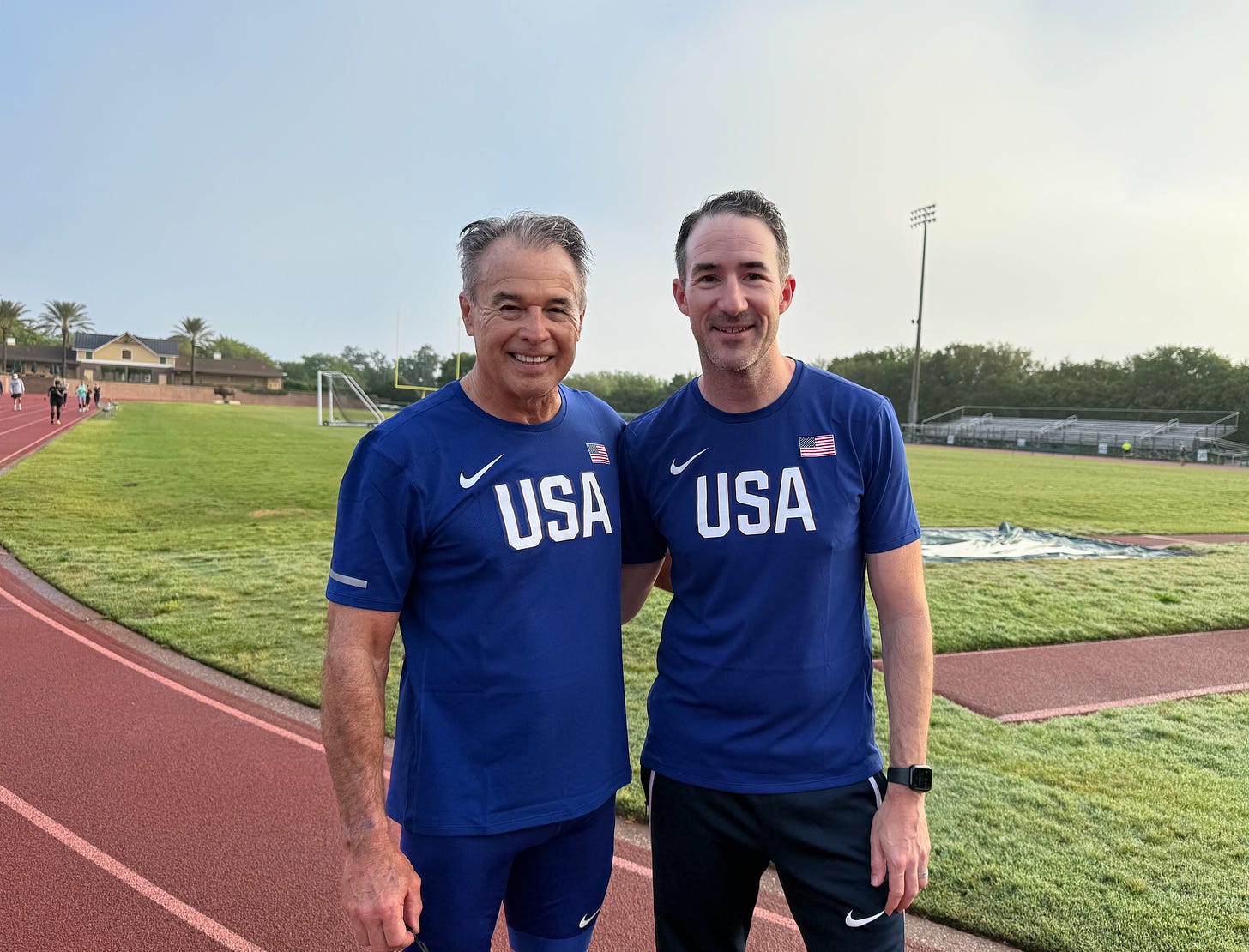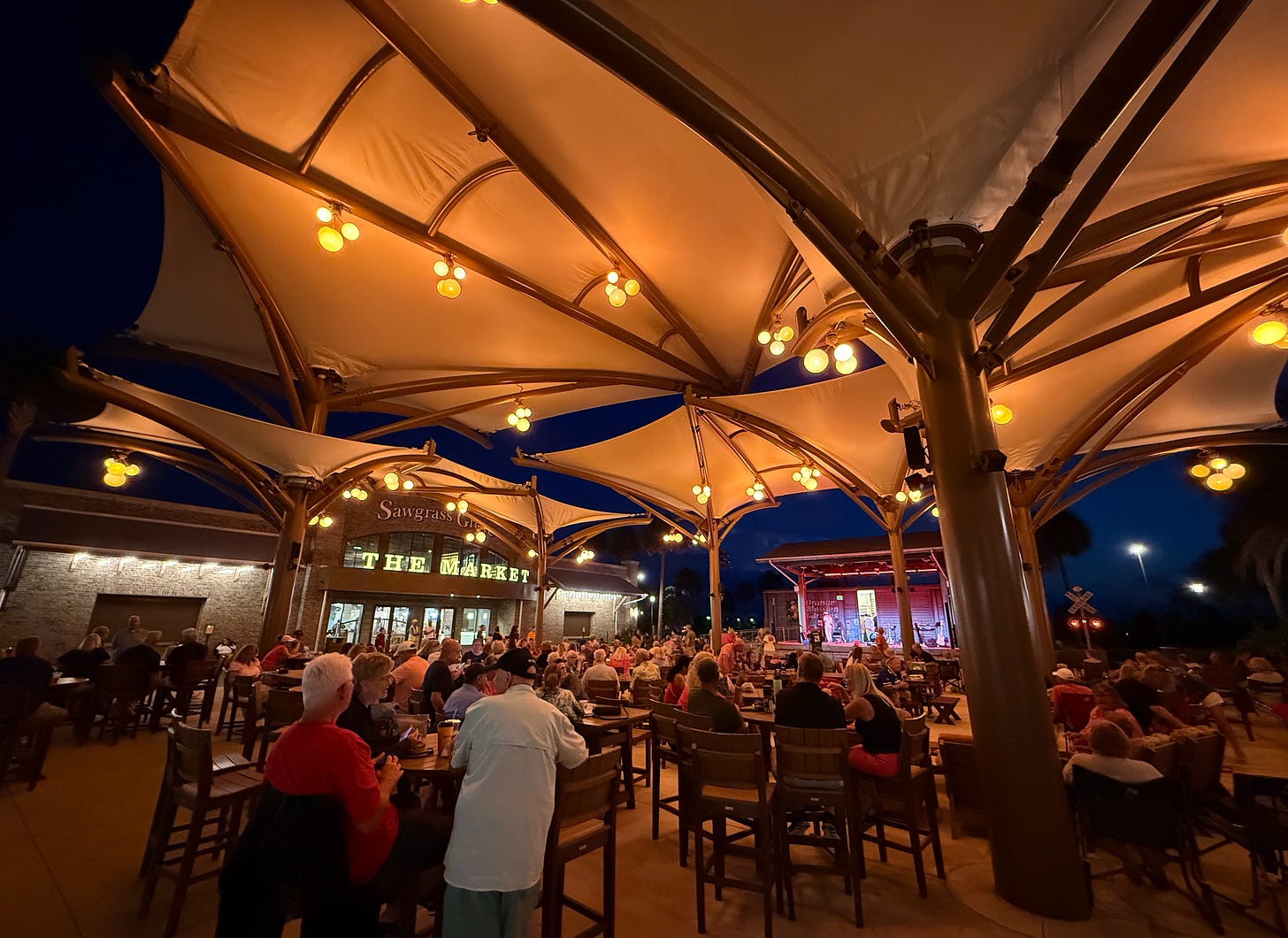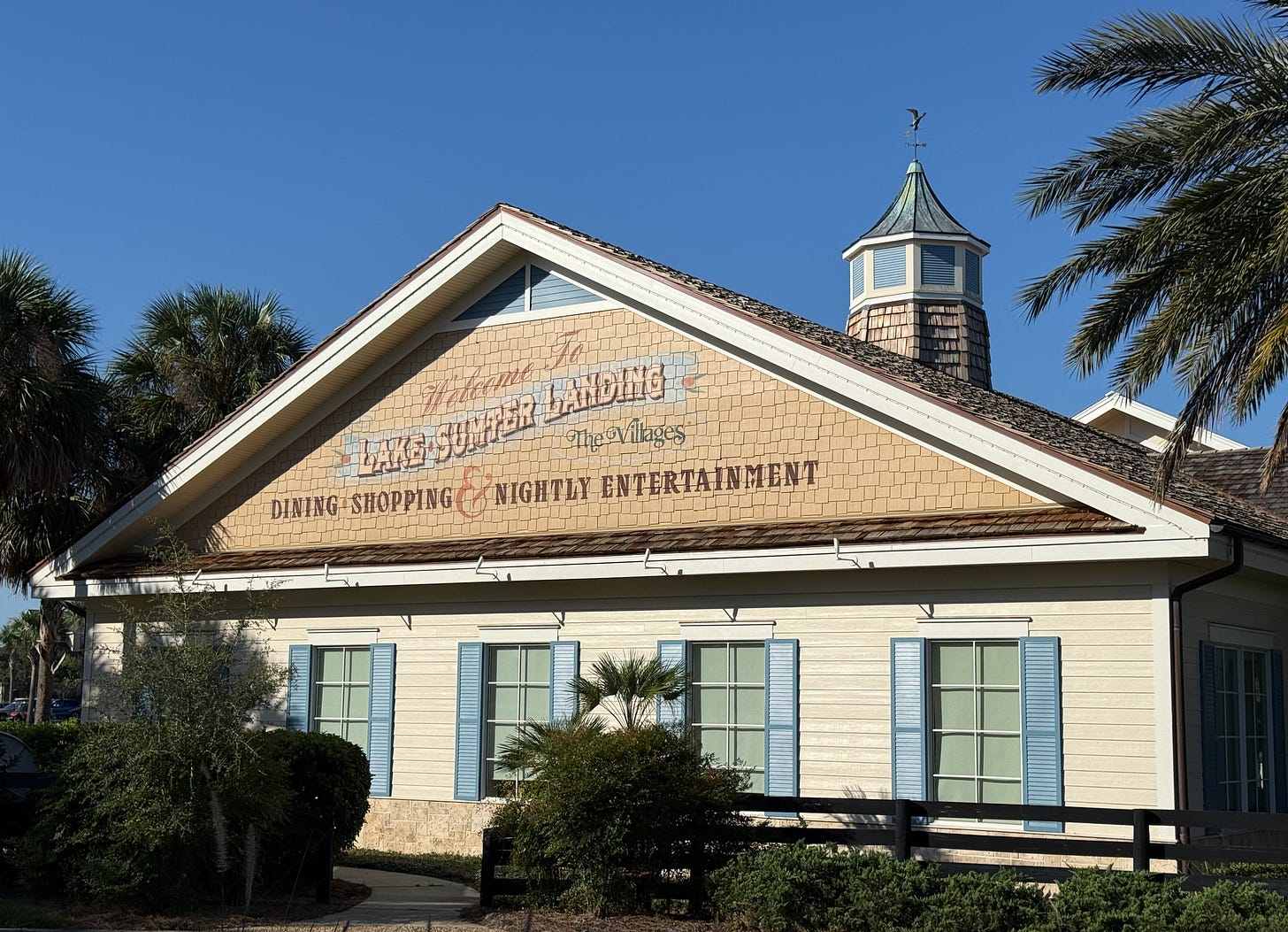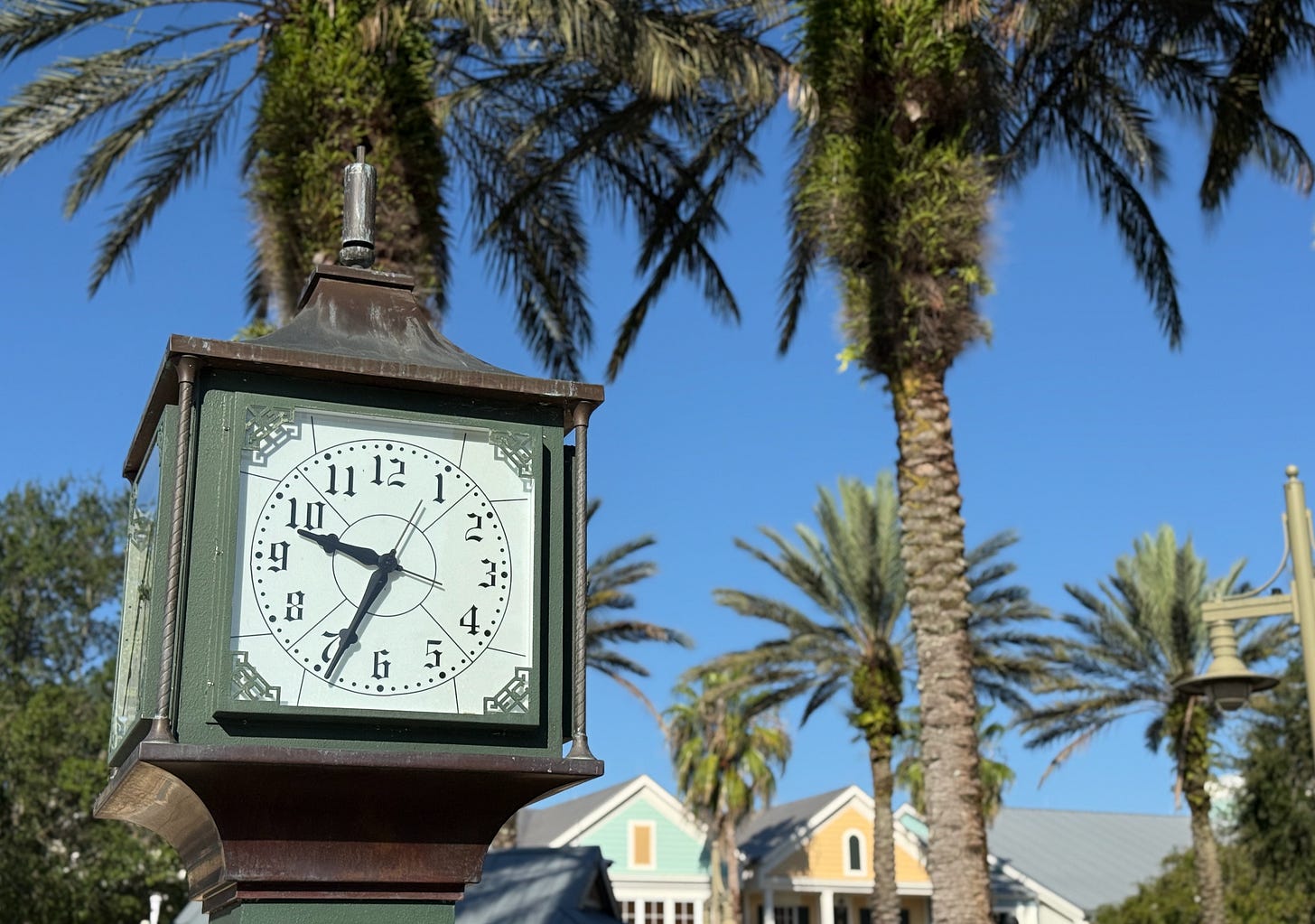Belonging at the Wrong Age
What Happens When You Ignore the Age-Based Script?
Personal note: I never expected to live in a retirement community at this stage of life. But doing so has exposed me to stories, questions, and relationships I didn’t know I needed. And it’s changing how I think about what comes next.
At 47, I’m surrounded by people who’ve mostly figured out what comes next. I’m still figuring things out for myself.
I live in the world’s largest retirement community and still work full-time. I don’t regularly golf and don’t plan to retire anytime soon. And yet, I’m here.
Not as a tourist or a contrarian. I’m just someone quietly observing what this place is teaching me about identity, aging, and belonging.
In Not Retired Yet: My Life in The Villages at 40-something, I wrote about what brought me here. And in Welcome to Leisureville, U.S.A., I unpacked the myths.
Now, I want to talk about what it means to live at the “wrong” age and what that experience has revealed.
A Strange Kind of Sync
My wife and I have worked from home for nearly two decades and don’t have kids. That gives us flexibility most people our age don’t get. But life in a retirement community is something else entirely.
It’s a place where leisure is typically the default. Where music plays in multiple town squares every night of the week. A place where activity starts early and then winds down by 9pm.
While I’m on Zoom calls, my neighbors are in hands-on courses learning new skills. When I’m front-loading my week on Sunday, they’re ending theirs quietly.
And yet, somehow, I’ve found a rhythm that suits me. Early morning workouts with athletes 20 years older than myself. Evening walks. It’s disorienting at first. Until it isn’t.
This challenges the assumption that belonging requires matching the people around you.
Who Gets to Belong?
Most of the time, I feel like a translator. I’m not just observing aging here. I’m interpreting it for myself and for anyone who still believes aging only looks one way.
Residents I haven’t met yet are often surprised to learn I live here. They assume I’m visiting someone or work nearby. But then they talk to me and realize I’m paying attention. That earns trust. Sometimes friendship. Always conversation.
What I’ve found is that most people here aren’t trying to escape anything. They’re building something new — often after major transitions like loss, retirement, divorce, or reinvention. This is intentional living with a longer timeline. And most workplaces haven’t caught up to what that means.
Residents here aren’t slowing down. They’re redirecting how to move forward. And while I’m younger than most of my neighbors, I’m asking the same questions they’re asking themselves.
What do I want my next chapter to feel like? What actually matters now?
Teachers I Didn’t Expect
My 68-year-old friend didn’t keep working because she needed the money. She kept working because she finally had the courage to quit the job that was quietly killing her spirit. Then she started the business she’d dreamed about for 30 years at age 66. Her Etsy shop made more last month than my consulting did all quarter.
As a result of learning about her story, I’ve realized I’m not studying aging here. I’m learning from people who’ve stopped making excuses.
Recently, I met a 61-year-old studying ChatGPT to coach their small business clients. This isn’t reinvention for its own sake. It’s what happens when curiosity doesn’t age out. The script for aging is being rewritten in real time here.
Living With the Questions
When my mom passed away a few years ago, my dad moved to The Villages. Shortly after, my wife and I moved here too. It wasn’t part of some long-range vision or plan.
But the chance to be closer to family, and to study aging, felt too important to ignore.
Now I hang with with my dad most Wednesdays. We take walks or go to the movie theatre. I join him for doctor’s appointments when possible, which he finds helpful.
And my sister’s nearby. So for the first time in two decades, we’re all in the same place. Some days it feels surreal. Other days, it feels like a gift.
What I’m living isn’t just personal. It’s a preview. As lifespans extend and remote work normalizes, more people are finding themselves rethinking where they belong and when.
I don’t know how long we’ll stay in here. Maybe a few more years. Maybe a couple of decades. But I do know I’ll never forget this time.
What This Taught Me About Belonging
I came here thinking I’d be an outsider. One who didn’t fit. An anomaly.
But I’ve realized that aging doesn’t erase the desire to be seen, understood, and accepted. If anything, it makes that desire more urgent.
I previously wrote about the myth that retirement communities are where ambition goes to die. Living here, I’ve seen the opposite. It’s where ambition gets redirected. I’ve met people bucking society’s story about what life looks like after 65. And I’m absorbing every lesson.
Belonging has less to do with age and more to do with courage. The courage to show up in a place that doesn’t quite make sense yet. The courage to reimagine who you are in the second half of life. The courage to stay curious, even when the world says it’s too late.
Here’s the math that changed me. My 42-year-old friend just realized he has 26 years left until “retirement.” That’s less time than my 68-year-old friend “wasted” before starting her Etsy shop. And she still built the life she wanted.
The question isn’t whether we’re too old to start over. It’s whether we’re brave enough to stop pretending we have infinite time to figure it out.
Are You Aging on Autopilot?
We’ve built a world that sorts people by age — school, work, retirement — and calls that normal. But what if that sorting is the problem?
Society treats “not fitting in” as a personal flaw. Maybe that’s a clue the system no longer fits us.
The people rewriting their stories after age 50 aren’t asking for permission. They’re choosing curiosity over convention.
So I’m curious, what’s one story you’ve been told about aging or identity that you’re starting to question?
Until next time,
Rethink Aging With Us
This is for you:
If you’re in your 30s, 40s, 50s, or beyond and not ready to fade out.
If you’re a builder, strategist, or decision-maker trying to understand what aging really means for your product, team, city, or community.
If you’re tired of “decline narratives” about age and are ready for something more honest, more useful, and more human.
Join other curious and forward-thinking people who are reconsidering what older age can be — and how to live it with intention.
Share age/proof design
Enjoyed this issue? Please forward this to friends or share by clicking below:






I had great role models when it came to not living like everyone else. My parents sold their restaurant of 25 years and lived on a sailboat. Then they worked as a chef and hostess at a cattle ranch. Then they lived in the Turks and Caicos. Now in their late 80s and still living on their own.
I followed their example by stepping down from my 27 year therapy practice and starting a real estate business with my husband.
Living like everyone else is boring. 🤣
I love this.
I recently started learning ChatGPT for personal and professional use, and felt old and behind starting this at 49. This piece is such a refreshing perspective on reinvention, courage, and living life to the fullest at any age!